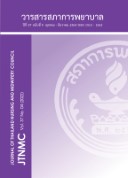Effects of Advance Directive Information Package Program on Health Engagement in Cancer Patients Receiving Palliative Care
Keywords:
advance directive information program, advance directive, health engagement, cancer patients, Palliative CareAbstract
Objective: To examine the effects of an advance directive information package program on health engagement in cancer patients receiving palliative care.
Design: Quasi-experimental research with two groups, pre-test and post-test design.
Methodology: The sample consisted of 64 patients receiving palliative care at a single Medical Center. Thirty-three patients were assigned to control and experimental groups for each group. The experimental group participated in the advance directive information program from the researcher. The program included goal setting; education using the advance directive information package; information gathering; reinforcement; and feedback. Roy Adaptation Model was applied as a framework. The instruments used for data collection were demographic and clinical data form, and the Patient Health Engagement scale questionnaire. Data were analyzed using descriptive statistics and Paired and Independent t-tests, with the significant level set at 0.05.
Results: The results revealed that, after completing the program, the experimental group had significant higher patient health engagement score than the control group did ( = 2.38, SD = .554; = 3.47, SD = .671; t = -7.568; p = .000). In addition, in the experimental group, post-intervention patient health engagement score was higher than pre-intervention score significantly (p = .000).
Recommendation: The advance directive information program helped promote engagement in advance directive care plan among cancer patients receiving palliative care. Patients who were able to effectively adapt themselves would be more likely to demonstrate an active health engagement behaviors in deciding to take part in treatment planning, setting goal, and choosing their appropriate choices of future advance directive plan. Palliative care nurses could apply the procedure proposed in this study to this patient group for encouraging each patient to take part in determining his/her desired advance directive plan.
Downloads
References
Boonchalermvipas S. End of patients’ life: a medical fact with legal limits. Public Health & Health Laws Journal. 2015;1(3):241-53. (In Thai)
Pimsen A, Wirojratana V, Jitramontree N. Communitydwelling older adults’ attitudes, subjective norm, perceived behavioral control, and intention to make living wills. Thai Journal of Nursing Council. 2019;34(1):74-87. (In Thai)
Sedini C, Biotto M, Crespi Bel’skij LM, Moroni Grandini RE, Cesari M. Advance care planning and advance directives: an overview of the main critical issues. Aging Clin Exp Res. 2022;34(2):325-30. doi:10.1007/s40520-021-02001-y.
Kizawa Y, Yamaguchi T, Yotani N. Advance care planning in cancer care. Gan To Kagaku Ryoho. 2016;43(3):277-80.
Rosenblum AM, Chasen MR. Palliative Care: Who is Responsible? J Natl Compr Canc Netw. 2018;16(6): 791-2. doi:10.6004/jnccn.2018.7047.
Hui D, Hannon BL, Zimmermann C, Bruera E. Improving patient and caregiver outcomes in oncology: Team-based, timely, and targeted palliative care. CA Cancer J Clin. 2018;68(5):356-76. doi:10.3322/ caac.21490.
World Health Organization. Global atlas of palliative care. (2nd ed). London, UK: Worldwide Palliative Care Alliance, 2020.
McDonald JC, DuManoir JM, Kevork N, Le LW, Zimmermann C. Advance directives in patients with advanced cancer receiving active treatment: attitudes, prevalence, and barriers. Support Care Cancer. 2017;25(2):523-31.
Roy C. The Roy adaptation model. (3rd ed). Upper Saddle River, NJ: Pearson, 2009.
Roy C, Bakan G, Li Z, Nguyen TH. Coping measurement: creating short form of Coping and Adaptation Processing Scale using item response theory and patients dealing with chronic and acute health conditions. Appl Nurs Res. 2016;32:73-9.
Graffigna G, Barello S, Bonanomi A, Lozza E. Measuring patient engagement: development and psychometric properties of the Patient Health Engagement (PHE) Scale. Front Psychol. 2015;6:274. doi:10.3389/ fpsyg.2015.00274.
Graffigna G, Barello S. Spotlight on the Patient Health Engagement model (PHE model): a psychosocial theory to understand people’s meaningful engagement in their own health care. Patient Prefer Adherence. 2018;12:1261-71. doi:10.2147/PPA.S145646.
Gazarian PK, Cronin J, Dalto JL, Baker KM, Friel BJ, Bruce-Baiden W, et al. A systematic evaluation of advance care planning patient educational resources. Geriatr Nurs. 2019;40(2):174-80. doi:10.1016/ j.gerinurse.2018.09.011.
Immanee S, Chanruangvanich W, Chayaput P, Itthimatin P. Predictors of distress in family caregivers of neurosurgery patients during palliative care. Thai Journal of Nursing Council. 2020;35(4):54-69. (In Thai)
Creer T. Self-management of chronic illness: handbook of self-regulation. San Diego, CA: Elsevier, 2000.
Nilchaikovit T, Lortrakul M, Phisansuthideth U. Development of Thai version of Hospital Anxiety and Depression Scale in cancer patients. Journal of the Psychiatrist Association of Thailand. 1996;41(1): 18-30. (In Thai)
Chiu wu C-H, Perng S-J, Shi C-K, Lai H-L. Advance care planning and advance directives: a multimedia education program in community-dwelling older adults. J Appl Gerontol. 2020;39(8):811–9. doi: 10.1177/0733464819831596.
Khamho M, Wanitkun N, Danaidutsadeekul S, Thephamongkhol K. Predictive model of quality of life in patients with head and neck cancer after radiotherapy. Nursing Science Journal of Thailand. 2018;36(2): 54–66. (In Thai)
Graffigna G, Barello S, Bonanomi A, Menichetti J. The motivating function of healthcare professional in eHealth and mHealth interventions for Type 2 Diabetes patients and the mediating role of patient engagement. J Diabetes Res. 2016;2016:2974521. doi:10.1155/2016/2974521.
Voumard R, Rubli Truchard E, Benaroyo L, Borasio GD, Büla C, Jox RJ. Geriatric palliative care: a view of its concept, challenges and strategies. BMC Geriatr. 2018;18(1):220. doi:10.1186/s12877-018-0914-0.
Elshamy K. Cultural and ethical challenges in providing palliative care for cancer patients at the end-of-life. Palliat Med Hosp Care Open J. 2017;SE(1):S75-84. doi:10.17140/PMHCOJ-SE-1-116
Downloads
Published
How to Cite
Issue
Section
License
Copyright (c) 2022 Thai Journal of Nursing Council

This work is licensed under a Creative Commons Attribution-NonCommercial-NoDerivatives 4.0 International License.








